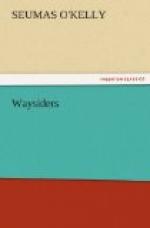Stray cabins skirted the roadside. Some people moved about them, leaving one the impression of a remoteness that was melancholy. The women in their bare feet made little curtesies to the Friar. Children in long dresses ran into the cabins at sight of the strangers, like rabbits scuttling back to their burrows. Having found refuge they looked out over the half-doors as the car passed, their eyes sparkling, humorous, full of an alert inquisitiveness, their faces fresh as the wind.
A group of people swung along the road, speaking volubly in Irish, giving one the impression that they had made a great journey across the range of hills. They gave us a salutation that was also a blessing. We pulled up the car and they gathered about the Friar, looking up at him from under their broad-brimmed black hats, the countenances for the most part dark and primitive, the type more of Firbolg than Milesian origin.
When the Friar spoke to them they paused, shuffled, looked at each other, puzzled. Half unconsciously I repeated the priest’s words for them.
“Oh, you are heading for the house where Kevin Hooban is lying sick?”
“Yes.”
“The priest is going to read over him?”
“Yes.”
“And maybe they are expecting him?”
“Yes.”
“We heard it said he is very low, a strangeness coming over him.”
“Is the house far?”
“No, not too far when you are once a-past the demesne wall, with the ivy upon it. Keep on the straight road. You will come to a stream and a gullet and a road clipping into the hills from it to the right; go past that road. West of that you will see two poplar trees. Beyond them you will come to a boreen. Turn down that boreen; it is very narrow, and you had best turn up one side of the car and both sit together, or maybe the thorny hedges would be slashing you on the face in the darkness of the place. At the end of the boreen you will come to a shallow river, and it having a shingle bottom. Put the mare to it and across with you. Will you be able to remember all that?”
“Yes, thanks.”




